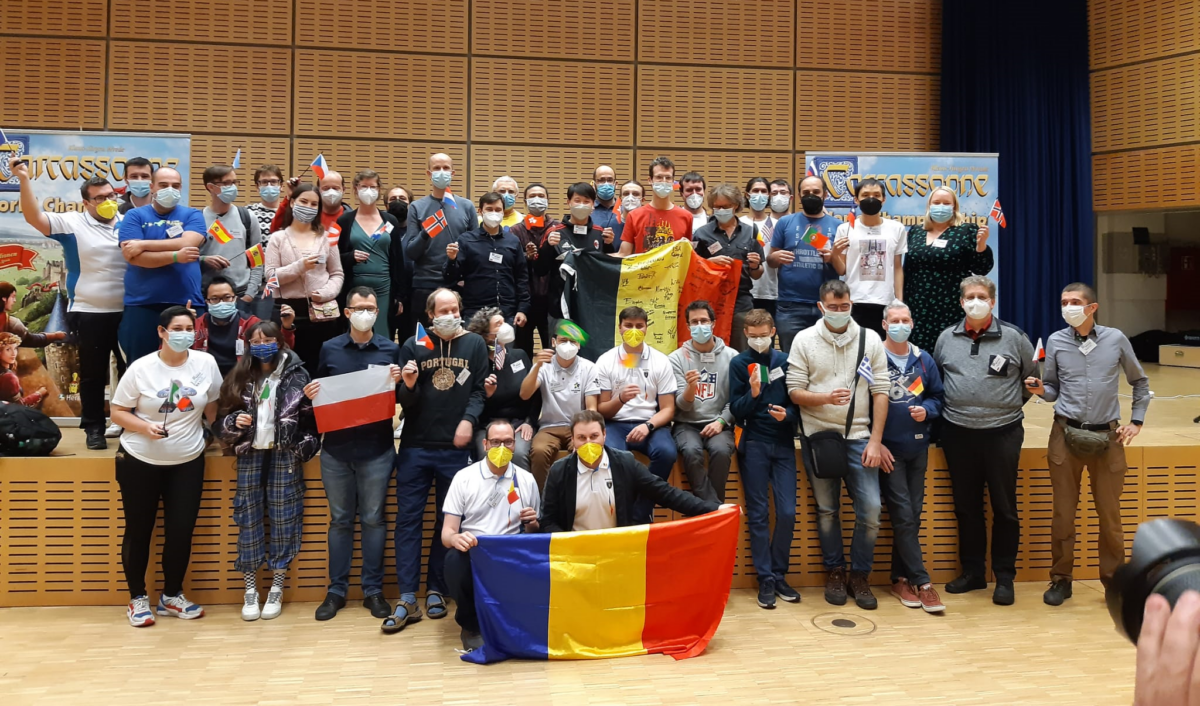The 15th edition of the Carcassonne Individual World Championship was held in Essen on 16 October. In this article I will talk about the development of the tournament, as well as my personal experience as a participant.
The championship:
Four years after my first participation in the World Cup in 2017, I returned to Germany with the joy of representing Catalonia as our first participant in this competition. The path that the Catalan community has had to take to achieve this goal has not been easy, but it has been very satisfying, as we have shown our great love for this game and the desire to unite the international community around it.
As for the overall development of the championship, I want to highlight the fantastic atmosphere that was noticeable before it started and which was maintained throughout the day. Smiles, hugs and gestures of friendship were repeated for hours, while at the same time all the title contenders and the players with less expectations fought fiercely to get as far as possible.
After the 5 qualifying rounds, these were the players qualified for the final direct elimination rounds:
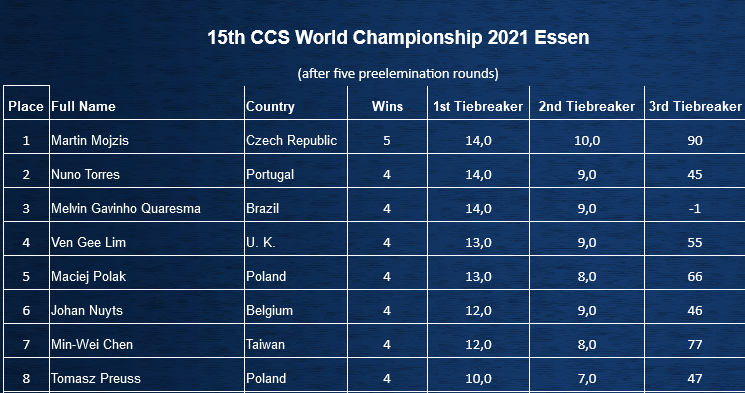
After playing the qualifying rounds, the Pole Maciej Polak and the Brazilian Melvin Quaresma reached the final. Both played a final worthy of the best players, where especially highlighted the control of the board and the tempo of Polak. Quaresma tried unsuccessfully, with their game more open to risk, to counter their opponent’s accuracy. The final score was 83-93 in favor of the Pole. With this victory, Poland becomes one of three countries that can boast of having two different world champions.
Proper names:
Maciej Polak: surely the Pole made one of the most perfect final games to be remembered. His ability to reflect and to use most tiles in the most optimal way impressed all the audience who were able to enjoy the final. A true master.
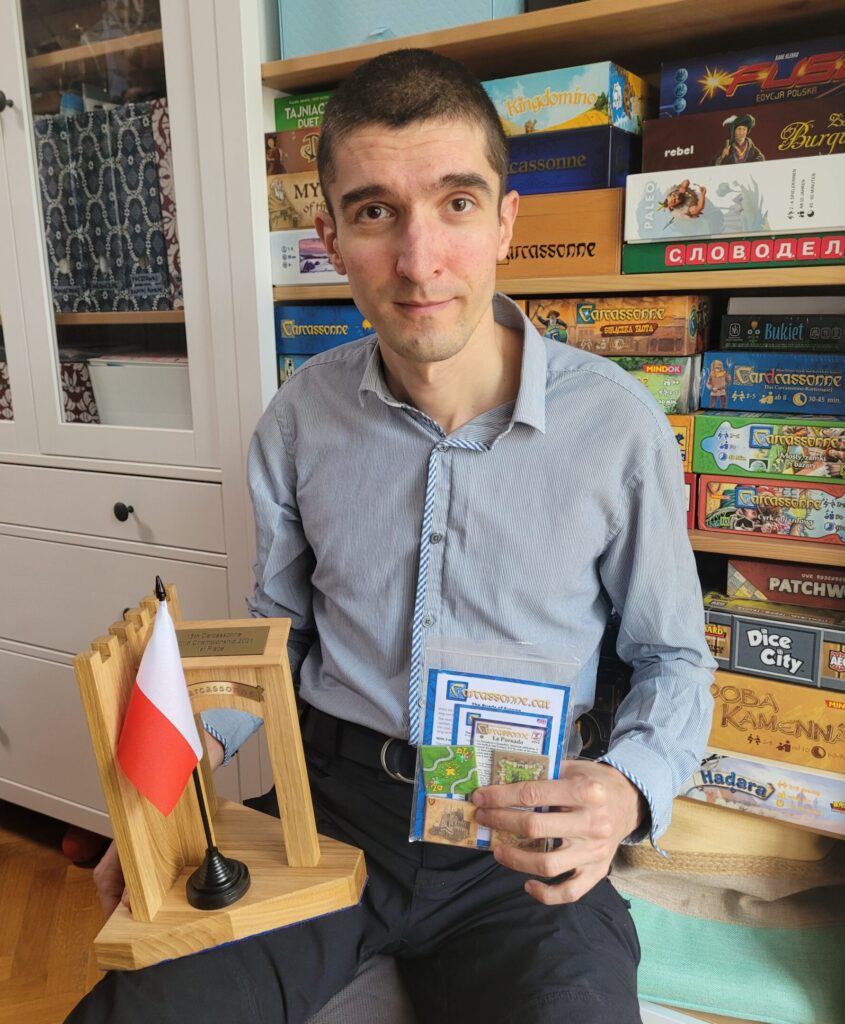
Melvin Quaresma: the Brazilian was without a doubt one of the centers of attention of the day. His affable personality and daring play style captivated everyone who came to watch his games. Few runners-up with such a big smile have been seen.
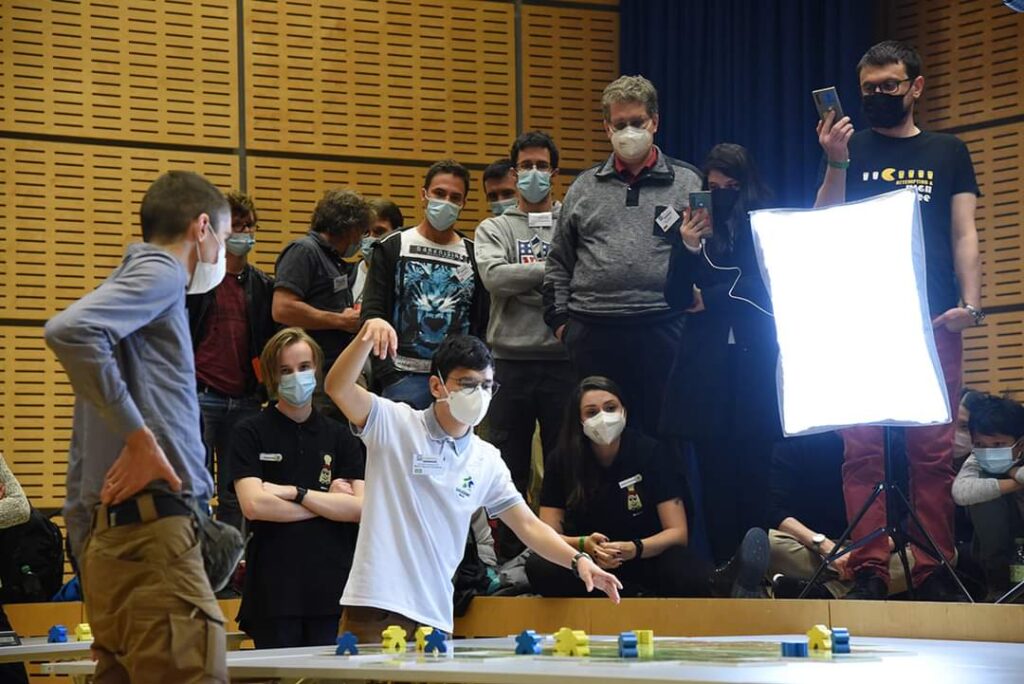
Tomasz Preuss: the other Polish world champion once again placed in the top 4 of the best players in the world. He’s been doing it so many times in recent years that it may seem easy, and it really isn’t.
Nuno Torres: despite being an unknown player in the international arena, he made his debut in a World Cup through the main door. He managed to finish in second place in the qualifying phase and finished in fourth place in the final ranking. Another great player coming out of the Portuguese quarry.
Martin Mojzis (Czech Republic): the former world champion and classic in almost every edition of the championship, finished in first place in the qualifying phase; a milestone that very few players can boast of having achieved.
Óscar Agudo (Spain): the Cantabria player also made his World Cup debut through the big door. Surely his position is the one no one wants to have, as the ninth-ranked is the first player to fall out of the final crossings. His game, markedly focused on blocking, was about to win a prize; he must be very pleased with his magnificent debut.
Marian Curcan (Romania): he presented himself in Essen as the reigning champion, synonymous with having all eyes fixed on him. However, he had a spectacular start to the competition, winning two former world champions. He finally failed to make it to the knockout stages, but at all times proved to be a great competitor.
Giacomo Lonati: the young Italian, only fifteen years old, became the youngest player to participate in the world championship. His debut, with three wins and two losses, ended in a commendable twentieth position; I expect we will hear about him in the future.
My personal experience:
Despite being my second participation in this event, my result was worse than I achieved the first time. My expectations were focused on improving my 14th position in 2017, but I finished 24th.
The first game I played was against Konstantin Butin, who was runner-up in the WTCOC 2021 with Russia. Unexpectedly, it was a pretty comfortable game, as without risking too much and securing positions to score easily, I kept a favorable distance from the beginning of the game. The final farm made my victory more exaggerated than one may have expected against such a strong opponent.
Secondly I played against the Portuguese Nuno Torres. It was a very tight game from start to finish; with a favorable start for me that started to balance when my opponent closed out a 16-point city that I tried to block without luck for 2 consecutive rounds. The last two tiles marked the difference: a 7-point monastery for Torres left the final score at +2 for him.
Norwegian John Egil was my third rival. It was a game of very few points, neither of which reached the sixties. I had very few opportunities to close constructions, while my rival protected himself from blockade attempts and made a city bigger and bigger that I tried to block by all means. With only 3 rounds left in the end he closed it and the 26 points he scored were lethal. The game ended with +3 in his favor.
Ruben Kocsis-Bakti of Hungary was my fourth opponent. It was probably one of the games I enjoyed the most, as we played together many times online. The match was very even at almost all times, until in the final stretch of the game during which I managed to close a good handful of constructions, which gave me a cushion to win comfortably.
The last game was against Vladimir Kovalev. The Russian, whom I had seen a few days before in Barcelona, beat me by 4 points in a game that I think we both enjoyed a lot. Without the pressure of classifying ourselves or not, we were able to develop control strategies that made the game a very balanced battle that was resolved by the final distribution of tiles.
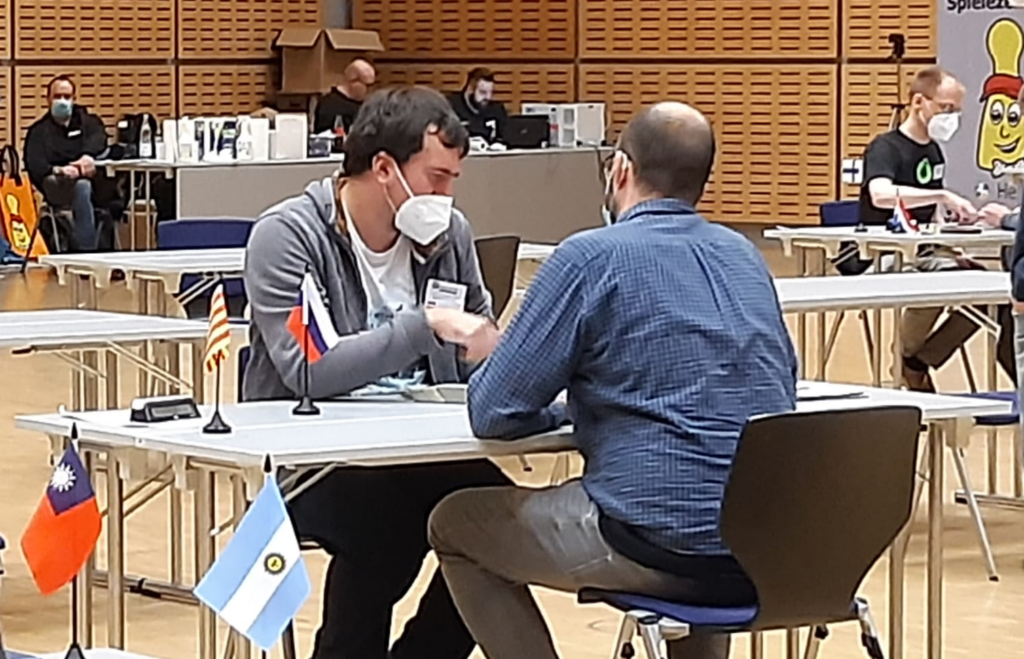
Acknowledgments:
To HiG and Spielezentrum Herne for making Catalonia’s participation in the World Cup possible this year, together with the help of Devir Ibèria.
To all the colleagues of Carcassonne.cat for the hours and the enthusiasm invested to make our collective project a reality that year after year is reaching new milestones.
To Dani, Núria, Laura and Adelaida to support me during the day of the championship.
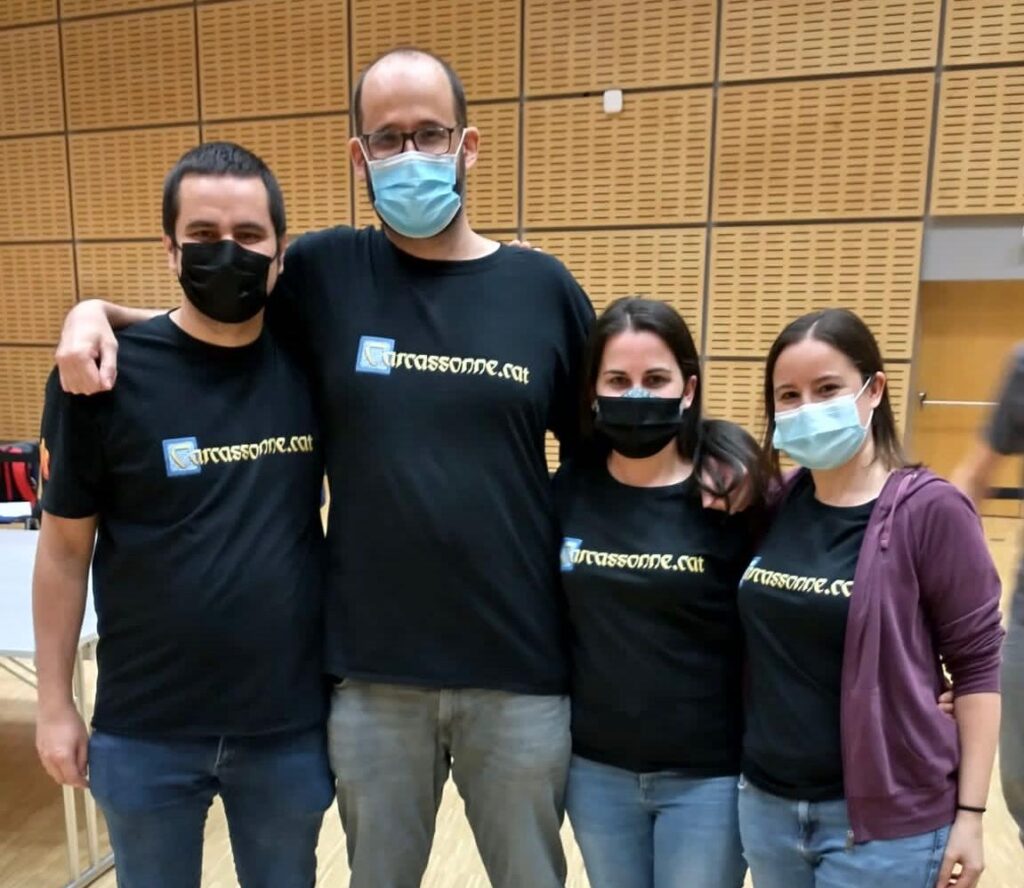
To Melvin Quaresma for teaching us that a runner-up can also be infinitely happy. Quite an example.
To Kerry Alley for her way of doing things, helping to forge bonds within the Carcassonne international community.
To Marian Curcan to get us the video of the final and for his temperament and humility.
Finally, to all the players who love this game in a healthy and sporty way, for its honesty and values.
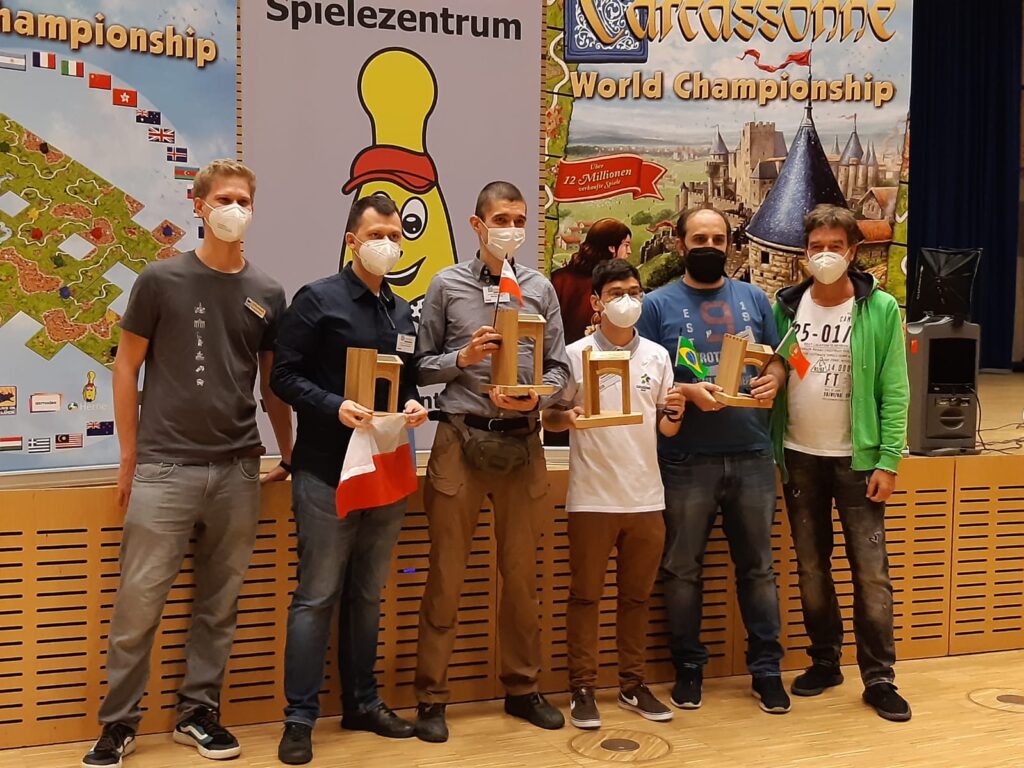

El passat 16 d’octubre es va dur a terme a Essen la 15a edició del campionat del món individual de Carcassonne. En aquest article parlaré del desenvolupament del torneig, així com de la meva experiència com a participant.
El campionat:
Quatre anys després de participar al mundial per primer cop, tornava a Alemanya amb la il·lusió de representar a Catalunya en la seva primera participació en aquesta competició. El camí que ha hagut de recórrer la comunitat catalana per assolir aquesta fita no ha estat fàcil, però sí molt satisfactori, ja que hem demostrat la nostra gran estima per aquest joc i les ganes d’agermanar la comunitat internacional al seu voltant.
Pel que fa al desenvolupament general del campionat, vull destacar el fantàstic ambient que es respirava abans de començar i que es va mantenir durant tot el dia. Els somriures, les abraçades i els gestos de complicitat es van repetir durant hores, mentre paral·lelament tots els aspirants al títol i els jugadors amb menys expectatives lluitaven aferrissadament per aconseguir com més victòries millor.
Després de les 5 rondes classificatòries, aquests van ser els jugadors classificats per als encreuaments finals:

Un cop jugades les rondes eliminatòries, van arribar a la final el polonès Maciej Polak i el brasiler Melvin Quaresma. Tots dos van disputar una final digna dels millors jugadors, on especialment va destacar el control del taulell i del tempo de Polak. Quaresma va intentar sense èxit, amb el seu joc més obert al risc, contrarestar la precisió del seu rival. El resultat final va ser de 83-93 a favor del polonès. Amb aquest triomf, Polònia es converteix en un dels tres països que pot presumir de tenir dos campions mundials diferents.
Noms propis:
Maciej Polak: segurament el polonès va fer una de les partides finals més perfectes que es recorden. La seva capacitat de reflexió i de fer servir la majoria de llosetes de la manera més òptima van impressionar tot el públic que va poder gaudir de la final. Un autèntic mestre.

Melvin Quaresma: el brasiler va ser sense cap mena de dubte un dels centres d’atenció del dia. La seva personalitat afable i el seu joc vistós i atrevit van captivar tothom que s’apropava a veure les seves partides. Pocs subcampions amb un somriure tan gran s’han vist.

Tomasz Preuss: l’altre campió del món polonès va tornar a situar-se en el top 4 dels millors jugadors del món. En els darrers anys ho està fent tantes vegades que pot semblar fàcil, i realment no ho és.
Nuno Torres: tot i ser un jugador desconegut en l’àmbit internacional va debutar en un mundial per la porta gran. Va aconseguir quedar en segona posició a la fase classificatòria i va acabar en quarta posició del rànquing final. Un altre gran jugador que surt de la pedrera portuguesa.
Martin Mojzis (República Txeca): l’excampió del món i clàssic en gairebé totes les edicions del campionat, va acabar en primera posició a la fase classificatòria; una fita que molt pocs jugadors poden presumir d’haver assolit.
Óscar Agudo (Espanya): el jugador de Cantabria també va debutar en un mundial per la porta gran. Segurament la seva posició és la que ningú desitja tenir, ja que el novè classificat és el primer jugador que es queda fora dels encreuaments finals. El seu joc, marcadament enfocat al bloqueig, va estar a punt de tenir premi; ha d’estar molt satisfet del seu magnífic debut.
Marian Curcan (Romania): es va presentar a Essen com a vigent campió, sinònim de tenir totes les mirades fixades sobre ell. Tot i això, va tenir un inici de competició espectacular, guanyant dos excampions del món. Finalment no va aconseguir passar a la fase eliminatòria, però en tot moment va demostrar que és un gran competidor.
Giacomo Lonati: el jove italià de només quinze anys es va convertir en el jugador més jove de participar en el campionat del món. El seu debut, amb tres victòries i dues derrotes, va finalitzar en una meritòria vintena posició; en sentirem a parlar.
Actuació de Catalunya:
Tot i ser la meva segona participació en aquest esdeveniment, el meu resultat va ser pitjor que l’assolit la primera vegada. Les meves expectatives estaven enfocades a millorar la catorzena posició del 2017, però no va ser possible, ja que vaig quedar 24è.
La primera partida la vaig jugar contra Konstantin Butin, sotscampió mundial per equips amb Rússia. Inesperadament va ser una partida força còmoda, ja que sense arriscar massa i assegurant posicions per puntuar fàcilment, vaig anar mantenint una distància favorable des de principis de la partida. La granja final va fer que la meva victòria fos més exagerada del que el nivell del rival faria esperar.
En segon lloc vaig jugar contra el portuguès Nuno Torres. Va ser una partida molt ajustada de principi a fi; amb un inici favorable per a mi que es va començar a equilibrar quan el meu rival va tancar una ciutat de 16 punts que vaig intentar blocar sense sort durant 2 torns consecutius. Les dues darreres llosetes van marcar la diferència: una església de 7 punts per a Torres va deixar el marcador final en un +2 per a ell.
El noruec John Egil va ser el meu tercer rival. Va ser una partida de molt pocs punts, cap dels dos va arribar als seixanta. Vaig tenir molt poques oportunitats de tancar construccions, mentre el meu rival es protegia dels intents de bloqueig i feia cada cop més gran una ciutat que vaig intentar blocar per tots els mitjans. A tres llosetes del final la va tancar i els 26 punts que va aconseguir van ser letals. +3 a favor seu.
Ruben Kocsis-Bakti d’Hongria va ser el meu quart oponent. Segurament va ser una de les partides que més vaig gaudir, ja que hem jugat plegats moltes vegades en línia. El matx va estar molt igualat gairebé en tot moment, fins que al tram final de la partida vaig aconseguir tancar un bon grapat de construccions, que em van donar un coixí per guanyar còmodament.
La darrera partida va ser contra Vladimir Kovalev. El rus, a qui havia vist uns dies abans a Barcelona, em va guanyar per 4 punts en una partida que crec que tots dos vam gaudir moltíssim. Sense la pressió de classificar-nos o no, vam poder desenvolupar estratègies de control que van fer de la partida una batalla molt equilibrada que es va resoldre pel repartiment final de llosetes.

Agraïments:
A HiG i Spielezentrum Herne per fer possible la participació de Catalunya al mundial, juntament amb la complicitat de Devir Ibèria.
A tots els companys de Carcassonne.cat per les hores i la il·lusió invertida per fer realitat el nostre projecte col·lectiu que any rere any va assolint noves fites.
Al Dani, la Núria, la Laura i l’Adelaida per donar-me suport durant el dia del campionat.

Al Melvin Quaresma per ensenyar-nos que un subcampió també pot estar infinitament content. Tot un exemple.
A la Kerry Alley per la seva manera de fer les coses, ajudant a teixir vincles dins de la comunitat internacional Carcassonne.
Al Marian Curcan, per fer-nos arribar el video de la final i pel seu tarannà i la seva humilitat.
Finalment, a tots els jugadors i jugadores que estimen aquest joc de manera sana i esportiva, per la seva honradesa i els seus valors.


